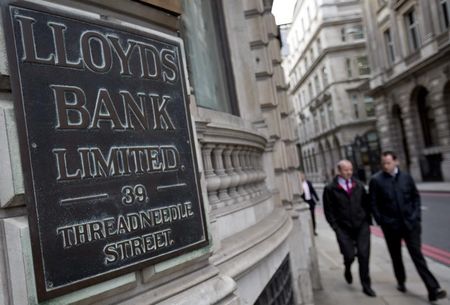By Matt Scuffham
LONDON (Reuters) - Lloyds Banking Group (L:LLOY) will on Tuesday aim to show its recovery is on track after only narrowly passing a European health check, putting a question mark over whether the bank can resume paying dividends this year.
Chief Executive Antonio Horta-Osorio will set out the bank's strategy for the next three years alongside third-quarter results which analysts expect to show an increase in underlying profit. But Lloyds may also set aside more funds to compensate customers mis-sold loan insurance.
Lloyds, 25 percent owned by the British government, is seeking to convince regulators that it is in shape to pay a "modest" dividend for the 2014 financial year - the first payout to shareholders since before the financial crisis.
But the bank was the worst-performing British bank in a stress test conducted by the European Banking Authority - the results of which were published on Sunday.
Lloyds' shares fell by 2 percent on Monday as analysts questioned whether it would be able to pass a similar test of British banks by the Bank of England in December and if Britain's financial watchdog will give a green light to dividends.
The BoE test assesses banks' resilience under a scenario where house prices fall by 35 percent and interest rates rise to 6 percent. It will place additional pressure on Lloyds, which is Britain's biggest provider of residential mortgages.
Its outcome is likely to determine whether Lloyds can pay a 2014 dividend and influence the timing of future sales of the government's shares in the bank. Reuters reported earlier in October that the government is unlikely to sell more shares until the bank is ready to pay dividends.
Macquarie analyst Ed Firth said that Lloyds' chances of passing the Bank of England test were in the balance.
"Given that we've got a more harsh stress test to come, it seems to me that there's got to be a major risk there. It's in the balance, 50-50," Firth told Reuters.
Firth doesn't expect Lloyds to be able to pay a dividend for 2014. He expects the bank to re-start dividend payments in 2015.
But the majority of analysts do expect Lloyds to pay a 2014 dividend, with the average forecast standing at 1.2 pence per share, according to a Thomson Reuters poll of 23 analysts.
Shares in Lloyds, which were one of the top performers in the FTSE 100 (FTSE) in 2012 and 2013, have fallen by 13 percent since mid-January, in part because anticipation among some investors that the bank would pay a dividend for 2013 proved over-optimistic.
The bank is expected to report an underlying pretax profit for the third quarter of 1.975 billion pounds, up from 1.5 billion in the same period the year before, according to a Reuters poll of six analysts.
Analysts at Morgan Stanley expect Lloyds to set aside a further 450 million pounds to compensate customers mis-sold loan insurance, taking its total bill to 10.85 billion pounds, more than any other bank.
Horta-Osario will announce plans to cut around 9,000 jobs, equivalent to around 10 percent of Lloyds' workforce, over the next three years as the bank closes branches in response to an increasing number of customers banking online and automates some back office functions.
The moves are designed to cut costs and increase profitability at the bank, which was rescued by a 20.5 billion pound government bailout during the financial crisis of 2007 to 2009.
Horta-Osorio has returned the bank to profitability since he was hired from Spain's Santander (MC:SAN) in March 2011, simplifying the business and slimming down to focus on lending to British households.
Senior Lloyds executives have been discussing the next stage of the bank's development since February and have focused on how many branches it needs to remain competitive and where further cost cuts can be made, sources familiar with the matter said.

Horta-Osorio committed in his 2011 strategy review to keeping branch numbers at the same level but a decline in customers using its branches and growth in those banking online and via mobile phone applications has prompted a re-think.
(Reporting by Matt Scuffham. Editing by Jane Merriman)
_800x533_L_1412520412.jpg)